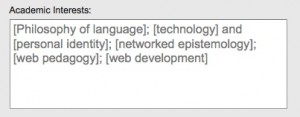I’m proud to announce the opening of the CUNY Academic Commons Development blog, which will track new technical developments on the Commons website.
The Commons is one of a number of academic projects in recent years that have sought to foster online communities in university settings. As George Otte, our fearless (and peerless) leader, has pointed out, the structural make-up of CUNY — the largest urban university in the world, with 23 campuses and a quarter of a million students — makes this project not just desirable, but also necessary for the university system.
What’s exciting about this moment at CUNY is that we’re (finally) seeing the rise of a number of open-source projects across the system. By choosing to construct the Academic Commons using a connected series of open-source platforms, we have engaged the growing movement of open education (join our local Open Education group here). Such efforts, I would argue, represent a twenty-first century extension of CUNY’s longstanding mission of making knowledge public, accessible, and affordable.
The remarkable thing about open source software–and, really, what defines it as open source–is that the code behind the program is released freely to users, who can then look at it and customize it for their needs. This is in contrast to a model of proprietary software, in which users are powerless to implement fundamental changes to the system without the help of the company that made the product.
Here at the Commons, we took a “small pieces loosely joined” approach, in which we have assembled a best-in-breed series of platforms (WordPress Multi-User + BuddyPress + BbPress + MediaWiki) and cobbled together a way for them them all work together. As we’ve tested out this system, we’ve found many things that work well, and other things that don’t. And as we find things that don’t work, we create custom plugins and extensions to fix the underlying problems.
The wonderful thing about open-source systems is that communities of developers and users tends to form around them in order to share their work and improve their websites. To truly be part of the open-source movement, we can’t just take–we have to give. And so, one reason we created this particular blog is to use it to release our custom code to the larger open-source community. That way, others can build on our work, just as we have built on theirs.
We have some exciting extensions to announce in the very near future, so please stay tuned.
Up next: introducing the CUNY Academic Commons Development Team.


